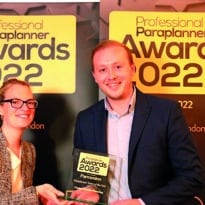My passion for financial planning
We interview Adam Wareing, head of paraplanning, Clarion Wealth Planning, winner of the IFP Paraplanner of the Year 2015
IFP Paraplanner of the Year 2015 Adam Wareing has a self-confessed “passion” for financial planning. Previously a financial planner, such was his desire to concentrate on “proper financial planning” he left the adviser firm he joint founded so that he could set up his own financial planning company. He is now head of paraplanning for Cheshire-based Clarion Wealth Planning.
Having won the IFP award, Adam says, he wants to follow in the footsteps of previous winners of the award and make a difference. “Like Gemma Siddle, Dan Atkinson and others before me, I want to give something back, to help raise the profile of paraplanning, for people to see the value it brings to financial planning firms,” Adam says. “Paraplanning has got to get away from the idea that it is just a research and reporting function. Paraplanners are capable of so much more and financial planning firms which recognise that are the ones that are going to be ahead of the game,” he says.
Becoming a paraplanner
Adam joined financial services in the mid 2000s at which time he set his sights on becoming a financial adviser. He has a degree in sports science and originally intended to pursue a career in physiotherapy but a poor job market for physiotherapists saw him take a job as a pension administrator with Norwich Union (now Aviva). He decided a career in financial services was where his future lay and he began gaining the qualifications necessary to become a financial adviser. He then worked for Friends Provident for two years and when the company was taken over in 2008, he and fellow colleague set up their own firm, Bury Financial Advisers, with Adam taking on the role of adviser/paraplanner. However, in 2013 he decided to leave to set up his own firm. He explains why: “Bury was a fantastic firm but I wanted to concentrate more on the financial planning rather than financial advice. I developed a real passion for financial planning, mainly driven by Paul Armson’s Inspiring Adviser online course, which changed the way I thought about financial advice and which I came across at just the right time for me.”
But running a one-man business is no mean feat and after a year Adam found that doing the financial planning, the administration, the paraplanning, the marketing and compliance etc, even with the support of a network, was affecting his work/life balance and something had to change. He started looking for financial planning roles when a recruitment company sent him the job spec for the head of paraplanning role with Clarion Wealth Management. “It peaked my interest and made me think about my strengths and realise that my skills do lie more in the traditional paraplanning role than a planner role,” he says. However, he admits he was still hesitant about the role. “My major concern was that I’d miss the client contact,” he says.
A meeting with Clarion assured him he would still have client contact, he would get to focus on the role that best suited him and, because the firm values the paraplanner role, he would have a larger role to play in the company too. The other main attraction of the job, he says, “is that Clarion is a true financial planning firm – the MD Ron Walker was one of the founding members of the IFP.” Adam joined the company in June 2014.
Transition to paraplanner
The transition from planner to paraplanner has been relatively straightforward, Adam says, because a large element of both his previous roles was paraplanning. The hardest part of the transition, he admits, “has been the change from running my own business to working for someone else.”
However, that has been helped by the responsibilities of the head of paraplanning role. In that respect, in particular, the move has been a really good one, he says, because the company recognises the value a good paraplanner can bring to the firm and he is involved in a number of internal committees, helping to steer and manage the firm. He is part of the leadership team, which consists of the head of administration, head of paraplanning, the operations director, head of advice and the managing director. “The team makes decision about where the business is going and the board level management are really receptive to ideas and it’s very much a team approach.” He also sits on the Investment Committee, which meets once a month.
A further benefit of working for Clarion, Adam says, is that the client bank is formed only of high net worth clients. “So, finally, I’ve been able to put into practice all the theory I learned for all the exams over the years.”
Adam is a Chartered Financial Planner, a Certified Financial Planner and has just taken the last two exams that should see him become a Fellow of the CII. “My idea with exams has always been to do them as soon as possible and get them out of the way. I find that’s best, then you can get on with doing the job.”
Interestingly, the next qualification he is looking at is not financial services based but in IT. He explains: “I’ve done as many financial services exams as are probably pertinent to my role as paraplanner, so I’m looking now at a qualification that will be of more general use to the business.”
Clarion has 12 staff in total, with three planners, three paraplanners including Adam and three administrators, with each planner being supported by a dedicated paraplanner and administrator.
The firm is very selective in the type of client it deals with, typically HNW business owners with £1m investible assets, who are in sight of selling their business. “We create an ideal client pathway, helping them prepare the business for sale and increasing the value, and then put together a full financial plan ahead of the business being sold,” Adam says.
Adam has a client bank of just over 40 clients and attends 80-90% of client meetings. “I find it really useful and it makes my job so much easier. If you’re not in the meeting you can’t get a full understanding of what their aims and objectives are; if you’re in the meeting you can get a real feel for the clients feelings and thoughts on things. I’d recommend it to any paraplanner. It benefits the planner too to have the paraplanner in the meeting.”
Every client has a full financial plan using cashflow forecasting. If there is one area Adam feels paraplanners in general could improve it is in the use of cashflow modelling software. “To my mind the future of financial advice is financial planning and cashflow modelling should be a key part of any plan. Paraplanners should be ensuring they are able to use at least one of the cashflow tools in the market, even if they don’t use it on a day-to-day basis at present,” he suggests.
Advice on making the transition
Having made the transition between financial planner and paraplanner, is there any advice he would give to financial planners thinking of doing the same?
“It would be don’t be afraid to take the step,” Adam says. “The important thing is to find the right company to join. I think that will become easier as more companies understand the value that a paraplanner can add to their structures. Also, look beyond paraplanning at how you can add value to the firm. I was apprehensive at first about making the move but it was definitely the right move to make.”
Annual planning meeting process
Adam describes the process for a client’ annual planning meeting. This is an area, he says, that Clarion is looking to automate as much as possible.
• A month before the client meeting we’ll send out a copy of their net worth statement, income and expenditure and get the client’s agreement to those. This comes back to us two weeks ahead of the meeting.
• I will then update the cashflow modeling software with the new figures, and then unstitch the financial plan, and stitch it back together again. By that I mean that rather than just change the figures I will sense check everything to make sure it makes sense. Then I’ll sit down with the adviser and discuss the changes.
• In the client meeting I will take notes for the minutes, and the day after the meeting I will prepare a draft financial plan and the minutes, which will then go to the adviser for their agreement.
• Within a week of the meeting the report will be sent to the client.
• If there is any regulated advice that comes off the back of that I’ll prepare the research and a report for the client’s agreement.
The IFP award process
The three major elements to the awards process were an online technical assessment, a 1,000 word response to a choice of two essay titles, either ‘What is a Paraplanner worth?’ or ‘A three-year training programme for a trainee paraplanner with no experience of working within a financial planning firm.’
Adam chose the latter, emphasising the importance of getting to grips with the financial planning elements of the role.
Finally entrants had to answers questions in front of a panel of four people. “It was like a Dragons Den situation, as you didn’t know who was going to ask a question next,” says Adam. “But it was a good experience. They were looking for opinions and it made me think about things I hadn’t done before about the day-to-day job, so I learned something from the interview process itself.”
Patrick Ingram, head of corporate marketing at Parmenion, said about Adam’s entry: “It’s an old saw worth repeating, that a financial plan is only as good as its assumptions, but going further it also has to make sense and be realistic in its conclusions. What was particularly impressive in Adam Wareing’s presentation this year was his firm grip on a realistic range of assumptions for investment returns and inflation, and his ability to see how these factors interact.”
What’s a typical week for Adam?
There isn’t a typical week but due to his position within the firm, Adam says, he attends more meetings than he had been used to doing.
Monday morning
Sales and marketing committee meeting, attended by head of advice, head of administration and head of paraplanning.
Monday afternoon
Client meeting or preparation for a client meeting.
Tuesday
Administration day and general paraplanning duties.
Wednesday morning
General paraplanning duties.
Wednesday afternoon
Leadership team meeting.
Thursday
Once a month, attendance at the Investment Committee meeting, for the separate discretionary investment arm, Clarion Investment Management, running three discretionary portfolios.
Otherwise it may be seeing clients, writing up the minutes or preparing draft financial plan.
Friday
Clear your mind, clear your desk day. “I generally find that Friday’s are the most productive days,” Adam says.





























